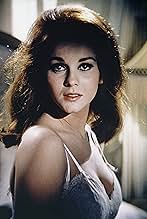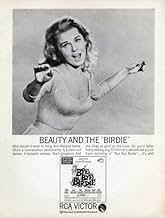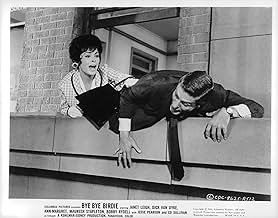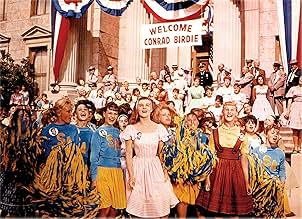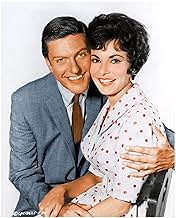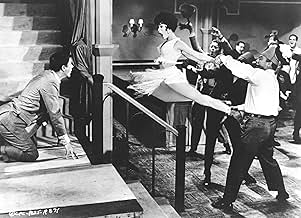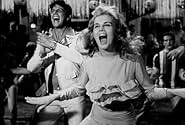IMDb RATING
6.6/10
9.9K
YOUR RATING
A rock singer travels to a small Ohio town to make his "farewell" television performance and kiss his biggest fan before he is drafted.A rock singer travels to a small Ohio town to make his "farewell" television performance and kiss his biggest fan before he is drafted.A rock singer travels to a small Ohio town to make his "farewell" television performance and kiss his biggest fan before he is drafted.
- Director
- Writers
- Stars
- Nominated for 2 Oscars
- 7 nominations total
- Director
- Writers
- All cast & crew
- Production, box office & more at IMDbPro
Featured reviews
I tend to agree with Alice from Orlando regarding this film. While "Bye Bye, Birdie" is a terrific film with terrific performances, viewed today, it's also a tribute to an era that we'll never get back. I completely agree with those historians who feel that 1953 - 1963, the ten year period between the end of the Korean War and that dark day in Dallas, was the last real "Era of Good Feeling" in American history. By and large, we knew who we were, what we were, and where we were going. Then came political assasination, the "Summer of Love," Viet Nam, Watergate, et. al., and we have a society that's not sure of anything anymore. Happily, there are films like "Bye Bye, Birdie," made during the apex of the 1953-63 period, to remind those of us who came of age during that era what we've lost, and to show those who weren't there what it was like. Would that we all had a Sweetapple, Ohio, to go back to again.
The vitriol below from fans of the Broadway original is absurd. Yes, this is not a filmed version of the stage play - GET OVER IT! What we have is a funny, smart, classic film musical that gets virtually everything right. Dick Van Dyke reprises his Broadway role while at the peak of his career, Paul Lynde gives his best film performance, Maureen Stapleton milks her part for all it's worth, and Ann-Margret is simply astounding! The only casting error is Janet Leigh - but they needed a name, since everyone else in the cast was unknown at the time. While Leigh gives a solid performance, songs had to be cut since she could sing only with difficulty. But this is a minor flaw - everything else about this film is spot on, as demonstrated by the sad effort to redo it for TV in 1995. It captures the era perfectly - of course, it's dated: it's about America in the early 60s! If it wasn't dated, it wouldn't work! So if you haven't seen it, get it - I just watched in in NYC's Bryant Park with thousands of jaded New Yorkers, and it won over that audience completely. Enjoy!
Instead of an adaptation of the original musical, it might be better to think of this movie as "A Variation on the Theme of Bye Bye Birdie." I've loved it since I was a kid and I don't really care how much or how little it's been changed. As a work standing on it's own it is wonderful, goofy, and good fun. An excellent piece of musical film-making. The casting is superb and I still laugh throughout the movie. Dated? Somewhat. Perhaps only superficially. 'N Sync was just in town and their effect here makes me think there's something fundamentally timeless about the behavior of teenage girls. I've heard it was the same when Frank Sinatra was a young singer. And there may be something timeless about us guys too... I'm still a sucker for the beginning and ending with Ann-Margret singing. She opens the movie sounding like a whining petulant little girl and at the end her reprise is as a worldly sophisticated sex-kitten. Just too cool.
I really mean it. On the surface, it appears to be a funny, innocent, slap-happy musical. And it is - at least during the first half of the movie. Then it starts to wink at itself. I was ten when I first saw it, and though I enjoyed it a lot of it went way over my head. Watching it now, ten years later, I realize that BYE BYE BIRDIE is actually a smart, sophisticated satire that's not for kids.
The title character is Conrad Birdie, a vain, oily rock-'n'-roll star who's been drafted by the army. In fact, the movie focuses not so much on him as it does on the other characters - a songwriter and producer (Dick Van Dyke), his girlfriend (Janet Leigh), and a teenage girl named Kim (Ann-Margret). Forget Jesse Pearson, who plays Conrad; it's Van Dyke and Margret's movie all the way.
As I said, this film is actually a satire. There are so many in-jokes and jabs at the 1960s that watching it is almost like reading an issue of MAD or CRACKED magazine. In particular, the Cold War comes in for some heavy ribbing (this movie was made during 1962, the year of the Cuban Missile Crisis); the Soviets are made to look like pompous buffoons, with one guy even whacking himself in the head with his shoe (hint, hint). It's still pretty funny nearly four decades later, but I can imagine how much more of a punch it would have packed back during those foreboding times. In other scenes, the movie predates the style of John Waters by poking some fun at suburbia.
Lots of satire - and most of it decisively adult. You can bet that kids simply won't understand the scathingly sarcastic remarks delivered by Kim's Archie Bunkeresque father (Paul Lynde), or Kim's budding sexuality. And of course they're not going to be familiar with Ed Sullivan (himself). Still, there are lots of joyfully kinetic dance numbers and memorable songs (most notably "Going Steady," "Got a Lot of Livin' To Do," and the tune everybody remembers: "Put on a Happy Face"). Kids will want to fast-forward the VCR to the musical numbers, and also the funniest moment in the picture, which involves a glass of drugged milk and a ballet conductor.
An excellent, well-made, highly underestimated comedy, and infinitely superior to the made-for-TV version from 1995. So get a bowl of popcorn and check out this classic piece of popular culture. Just be prepared to explain a lot to the kiddies...
The title character is Conrad Birdie, a vain, oily rock-'n'-roll star who's been drafted by the army. In fact, the movie focuses not so much on him as it does on the other characters - a songwriter and producer (Dick Van Dyke), his girlfriend (Janet Leigh), and a teenage girl named Kim (Ann-Margret). Forget Jesse Pearson, who plays Conrad; it's Van Dyke and Margret's movie all the way.
As I said, this film is actually a satire. There are so many in-jokes and jabs at the 1960s that watching it is almost like reading an issue of MAD or CRACKED magazine. In particular, the Cold War comes in for some heavy ribbing (this movie was made during 1962, the year of the Cuban Missile Crisis); the Soviets are made to look like pompous buffoons, with one guy even whacking himself in the head with his shoe (hint, hint). It's still pretty funny nearly four decades later, but I can imagine how much more of a punch it would have packed back during those foreboding times. In other scenes, the movie predates the style of John Waters by poking some fun at suburbia.
Lots of satire - and most of it decisively adult. You can bet that kids simply won't understand the scathingly sarcastic remarks delivered by Kim's Archie Bunkeresque father (Paul Lynde), or Kim's budding sexuality. And of course they're not going to be familiar with Ed Sullivan (himself). Still, there are lots of joyfully kinetic dance numbers and memorable songs (most notably "Going Steady," "Got a Lot of Livin' To Do," and the tune everybody remembers: "Put on a Happy Face"). Kids will want to fast-forward the VCR to the musical numbers, and also the funniest moment in the picture, which involves a glass of drugged milk and a ballet conductor.
An excellent, well-made, highly underestimated comedy, and infinitely superior to the made-for-TV version from 1995. So get a bowl of popcorn and check out this classic piece of popular culture. Just be prepared to explain a lot to the kiddies...
When 'Bye Bye Birdie' was the hit of the '59-'60 season on Broadway, it was as much for its satirical edge as for the talent on stage or the innovative direction by Gower Champion. By that time it was only too clear to savvy adults that Elvis Presley and rock'n'roll had been thoroughly co-opted and mainstreamed by Hollywood and Madison Avenue. For all its supposed danger and subversiveness in 1956, Rock was a pop culture commodity like any other by the end of the decade.
And by the time BYE BYE BIRDIE hit the screen in 1963, that point was too obvious to have any edge. Presley had long since become a bland and unfashionable movie personality, and rock itself had devolved into the kind of inconsequential June/Moon tunes that in a slightly different form had been hit parade staples for decades.
So the point is, the teen world BYE BYE BIRDIE was parodying was largely gone by that time already. Just a year later, when the Beatles appeared on Ed Sullivan (ironically he was still a King Maker but not for much longer) that world began to dissolve and reform unforgettably. So BIRDIE is the swan song for an era and an expression of Baby Boom nostalgia for kids who were too young to have enjoyed the '50s in quite the same way their older brothers and sisters had. How many children in '63 thrilled to the vigorous twitching of Ann-Margret and Bobby Rydell, hoping that was the teen world that awaited them in the future, only to discover by '68 that alienation and anger were the currency of the day? Not that those emotions were misplaced -- the times themselves demanded them. But there was a sense of loss too, a sense that we had been cheated out of fun: silly, twitchy dances and full skirts and snug pastel pullovers. There's a reason this film made an indelible impression on children then, and perhaps most on girls and gay boys.
It was an old-fashioned musical in a movie era that was confused but evolving rapidly, and Ann-Margret was a transitional star of that moment. A throwback to another Hollywood, she gets the traditional star buildup here, and it works spectacularly. Like Rita Hayworth in GILDA, A-M was the good/bad girl -- fresh and sweet and direct enough to please any elder, but with a smoldering animal eroticism so potent the screen seemed barely able to contain it. She is hot in the runway opening and delicious thereafter but she doesn't really become a star until a pivotal moment in the 'Got A Lot Of Livin' To Do' number when her eyes narrow, she smiles and grits her teeth and her hands envelope the head of a chorus boy while she parses out the lyrics of female sexual emancipation -- Daddy won't know his daughter indeed.
It was a sexual call to action that kids understood and responded to. So THIS was what being a teenager would be like! In that moment and the few minutes that followed, even gay boys felt the tops of their heads come off. It's an excitement that doesn't return until the coda: once again A-M is on the runway, but this time any pretense that she is sweet, innocent Kim McAfee has gone -- this is Ann-Margret, and the sexual light and heat of a new star is palpable. Unfortunately, she was almost immediately to become outdated. Within a few years she was a joke in pictures, and had to wait until 1971 and CARNAL KNOWLEDGE to make a 'comeback' -- at the age of 30, no less. She had made the mistake of starting too late, and being too traditional a Hollywood star just when Hollywood decided to do away with stars, at least those that were provokingly lovely.
So BIRDIE trembled on the edge of a new, harsher era, and those of us who were caught on the cusp of that upheaval feel great affection for the fantasy of rock stars like Birdie, for Sweet Apple High, and for the bouncy, shiny, crisp teenagers we never were.
And by the time BYE BYE BIRDIE hit the screen in 1963, that point was too obvious to have any edge. Presley had long since become a bland and unfashionable movie personality, and rock itself had devolved into the kind of inconsequential June/Moon tunes that in a slightly different form had been hit parade staples for decades.
So the point is, the teen world BYE BYE BIRDIE was parodying was largely gone by that time already. Just a year later, when the Beatles appeared on Ed Sullivan (ironically he was still a King Maker but not for much longer) that world began to dissolve and reform unforgettably. So BIRDIE is the swan song for an era and an expression of Baby Boom nostalgia for kids who were too young to have enjoyed the '50s in quite the same way their older brothers and sisters had. How many children in '63 thrilled to the vigorous twitching of Ann-Margret and Bobby Rydell, hoping that was the teen world that awaited them in the future, only to discover by '68 that alienation and anger were the currency of the day? Not that those emotions were misplaced -- the times themselves demanded them. But there was a sense of loss too, a sense that we had been cheated out of fun: silly, twitchy dances and full skirts and snug pastel pullovers. There's a reason this film made an indelible impression on children then, and perhaps most on girls and gay boys.
It was an old-fashioned musical in a movie era that was confused but evolving rapidly, and Ann-Margret was a transitional star of that moment. A throwback to another Hollywood, she gets the traditional star buildup here, and it works spectacularly. Like Rita Hayworth in GILDA, A-M was the good/bad girl -- fresh and sweet and direct enough to please any elder, but with a smoldering animal eroticism so potent the screen seemed barely able to contain it. She is hot in the runway opening and delicious thereafter but she doesn't really become a star until a pivotal moment in the 'Got A Lot Of Livin' To Do' number when her eyes narrow, she smiles and grits her teeth and her hands envelope the head of a chorus boy while she parses out the lyrics of female sexual emancipation -- Daddy won't know his daughter indeed.
It was a sexual call to action that kids understood and responded to. So THIS was what being a teenager would be like! In that moment and the few minutes that followed, even gay boys felt the tops of their heads come off. It's an excitement that doesn't return until the coda: once again A-M is on the runway, but this time any pretense that she is sweet, innocent Kim McAfee has gone -- this is Ann-Margret, and the sexual light and heat of a new star is palpable. Unfortunately, she was almost immediately to become outdated. Within a few years she was a joke in pictures, and had to wait until 1971 and CARNAL KNOWLEDGE to make a 'comeback' -- at the age of 30, no less. She had made the mistake of starting too late, and being too traditional a Hollywood star just when Hollywood decided to do away with stars, at least those that were provokingly lovely.
So BIRDIE trembled on the edge of a new, harsher era, and those of us who were caught on the cusp of that upheaval feel great affection for the fantasy of rock stars like Birdie, for Sweet Apple High, and for the bouncy, shiny, crisp teenagers we never were.
Did you know
- TriviaIronically, Bobby Rydell, who plays the timid Hugo Peabody, was himself a national teen idol before and after the film's production. In fact, in contrast to the original stage musical where Michael J. Pollard played the role, the part of Hugo was expanded significantly in the film to accommodate his teen celebrity.
- GoofsAfter Rosie pulls the McAfee family out of the audience at The Ed Sullivan Show (1948), two different shots of the Russian conductor show the McAfees still sitting in the audience.
- Quotes
Rose DeLeon: I must be the prized dope of all-time... thinking I could pry you away from your mama's ever-lovin' tentacles.
- Crazy creditsThere is no "The End" credit or cast list at the end of the film. Ann-Margret simply sings an on-screen reprise of the song "Bye Bye Birdie" at the end, and then says " 'Bye, now!".
- ConnectionsEdited into Histoire(s) du cinéma: Seul le cinéma (1994)
- SoundtracksBye Bye Birdie
Music by Charles Strouse
Lyrics by Lee Adams
Performed by Ann-Margret before the title credits, with Johnny Green and the Columbia Studio Orchestra and Chorus
Reprised by Ann-Margret in the finale
- How long is Bye Bye Birdie?Powered by Alexa
Details
- Release date
- Country of origin
- Languages
- Also known as
- Adiós, ídolo mío
- Filming locations
- Production company
- See more company credits at IMDbPro
Box office
- Gross worldwide
- $94
- Runtime
- 1h 52m(112 min)
- Color
- Aspect ratio
- 2.35 : 1
Contribute to this page
Suggest an edit or add missing content



